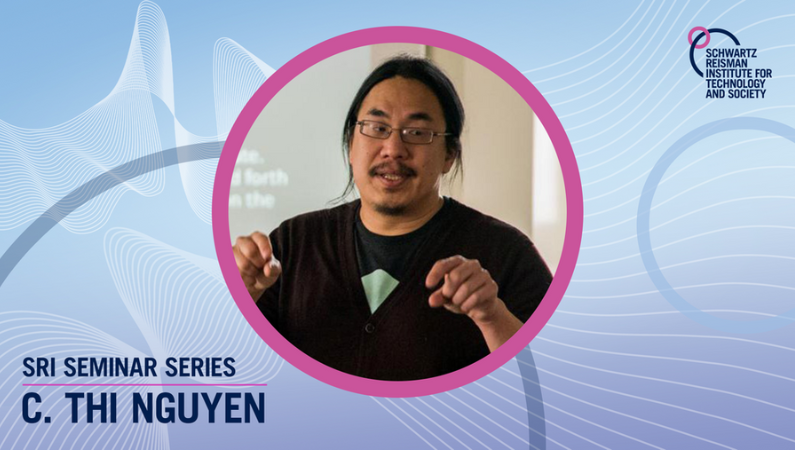

Our weekly SRI Seminar Series welcomes C. Thi Nguyen, an associate professor of philosophy at the University of Utah whose work explores how social structures and technologies shape how we think. Nguyen’s first book, Games: Agency as Art (2020), was awarded the American Philosophical Association’s 2021 Book Prize.
In this provocative talk, Nguyen explores how requirements for transparency can enact pressures on expert domains with deeply negative results. As Nguyen contends, while trust and transparency are both necessary, they remain in an “essential tension” with one another that lacks the potential for neat resolution and requires forms of compromise.
In her BBC Reith Lectures on Trust, Onora O’Neill offers a short, but biting, criticism of transparency. People think that trust and transparency go together but in reality, says O’Neill, they are deeply opposed. Transparency forces people to conceal their actual reasons for action and invent different ones for public consumption. Transparency forces deception. I work out the details of her argument and worsen her conclusion. I focus on public transparency—that is, transparency to the public over expert domains. I offer two versions of the criticism. First, the epistemic intrusion argument: the drive to transparency forces experts to explain their reasoning to non-experts. But expert reasons are, by their nature, often inaccessible to non-experts. So the demand for transparency can pressure experts to act only in those ways for which they can offer public justification. Second, the intimate reasons argument: in many cases of practical deliberation, the relevant reasons are intimate to a community and not easily explicable to those who lack a particular shared background. The demand for transparency, then, pressures community members to abandon the special understanding and sensitivity that arises from their particular experiences. Transparency, it turns out, is a form of surveillance. By forcing reasoning into the explicit and public sphere, transparency roots out corruption—but it also inhibits the full application of expert skill, sensitivity, and subtle shared understandings. We need both trust and transparency, but they are in essential tension. This is a deep practical dilemma; it admits of no neat resolution, but only painful compromise.
C. Thi Nguyen is an associate professor of philosophy at University of Utah. He writes about trust, art, games, and communities. He is interested in the ways that our social structures and technologies shape how we think and what we value.
To register for the event, visit the official registration page.
The SRI Seminar Series brings together the Schwartz Reisman community and beyond for a robust exchange of ideas that advance scholarship at the intersection of technology and society. Seminars are led by a leading or emerging scholar and feature extensive discussion.
Each week, a featured speaker will present for 45 minutes, followed by an open discussion. Registered attendees will be emailed a Zoom link before the event begins. The event will be recorded and posted online.